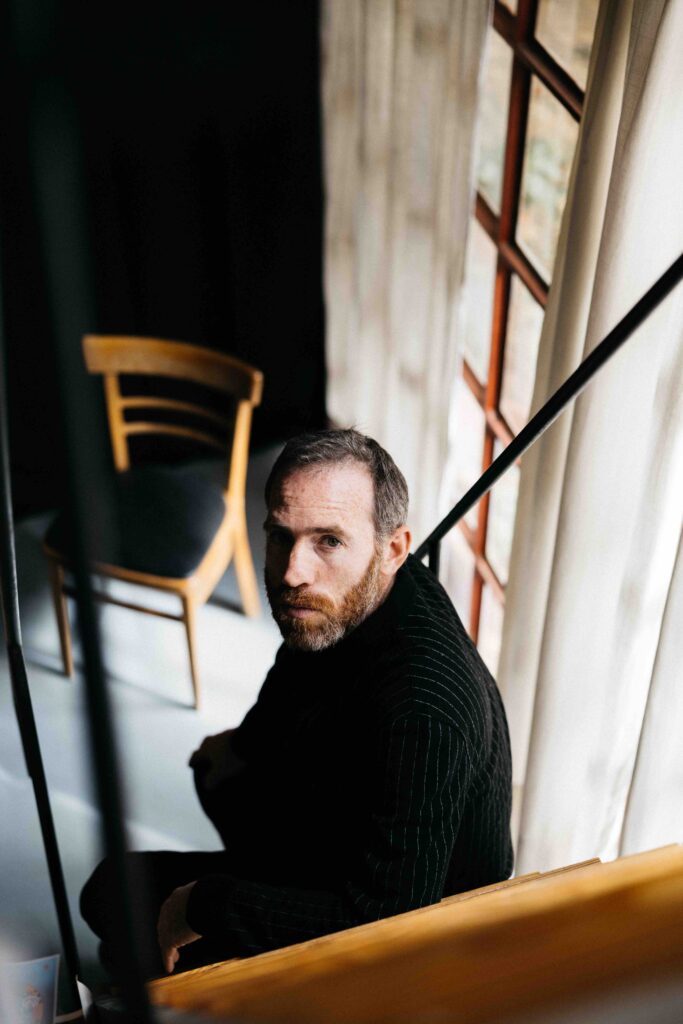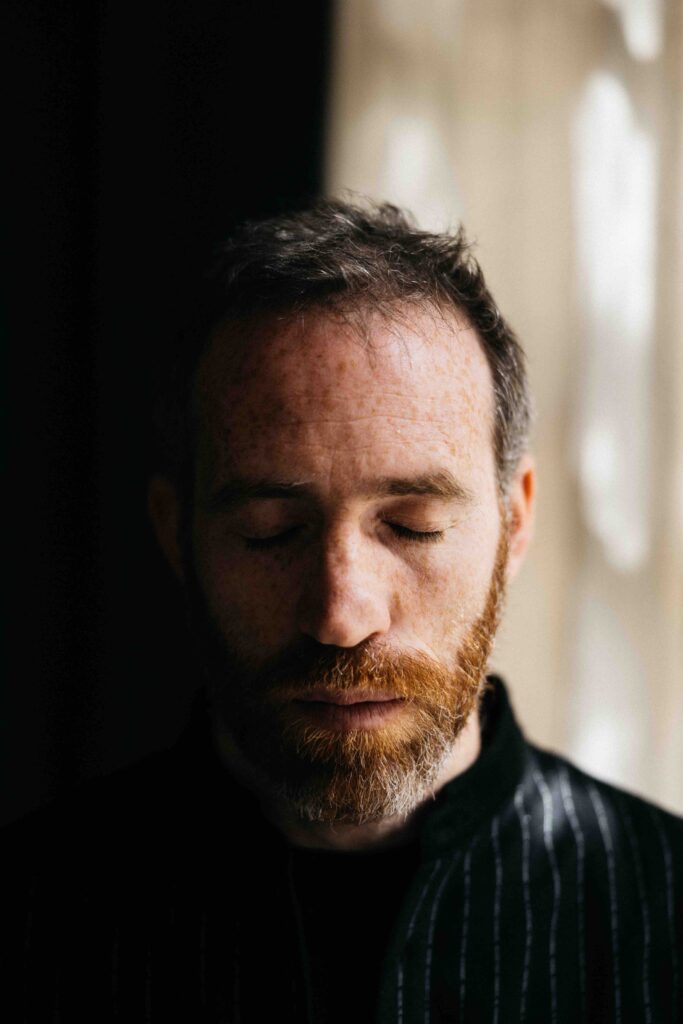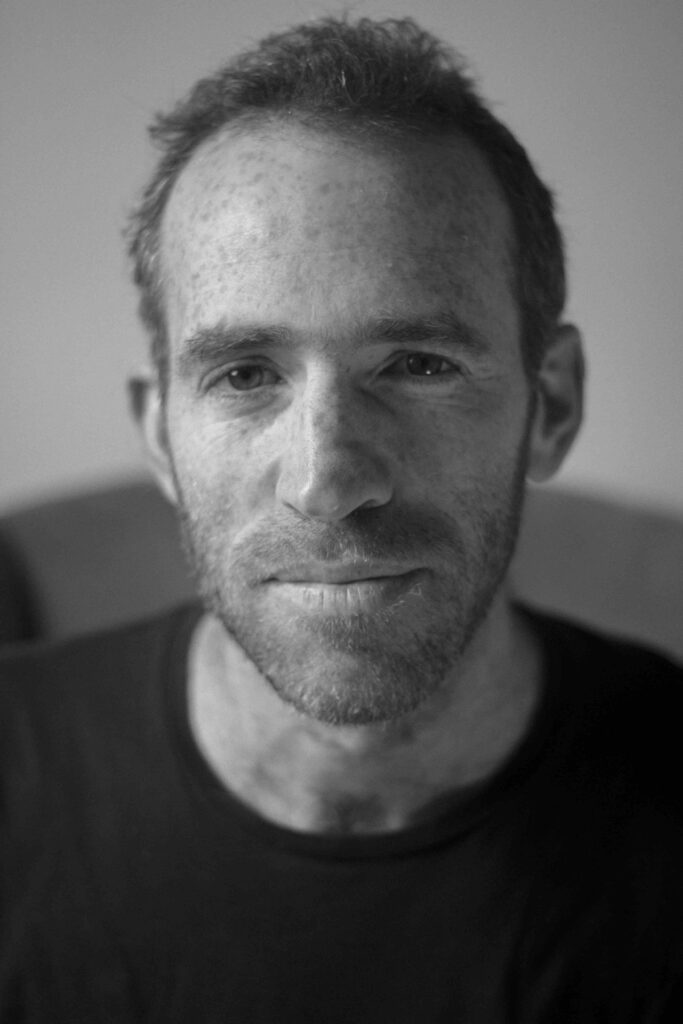We are listening to ‘irradiance’ as we write this, and the urge to stop writing and start crying is rather strong. It’s a feeling that carries through the overarching whole album, ‘imagiro’. A collection of improvised piano pieces, the record is simply beautiful, so simple yet so effective. Engulfing the listeners into a turbulent, cathartic and emotional sonic journey, ‘imagiro’ calls for introspection and self-reckoning, while being lullabied by Olec Mün’s refined musicianship.
Based in Barcelona, Spain, the talented creative developed ‘imagiro’ during an impromptu recording session in Bruno Sanfilippo’s studio Ad21Music. The result is in line with Mün’s creative mission, at least for the time being. Having dedicated 2024 to improvisation and further studies, the album feels like a coronation of deep artistic research, something we deeply respect.
Born in Argentina in 1985, Marcelo Schnock has been developing his project ‘Olec Mün’ since 2018, then accumulating a tremendous audience, captivated by his wonderful compositions.
Intrigued by ‘imagiro’, we caught up with the talented pianist to find out more about his artistry and future goals… Interview below!
Hi Marcelo, thanks for talking with us! I have been diving into your recent work a fair bit, and I must say the philosophy behind it is deeply refreshing. At a time when music is often planned or overproduced, you are introducing an aleatory element, trying to remain authentic to a specific moment in time. How did you come up with this ‘belief system’ (if you will)?
This last work, ‘Imagiro’, was not planned. For more than a year now, I have been deeply immersed into improvisation sessions and concerts which consist of a practice which transcends music. I have to be open and receptive in order to receive the inspiration of the moment. I must not play anything I know, I must not plan anything, just sit before the piano, breathe, enter a meditative state of calmness and from there on start playing.
Bruno Sanfilippo, who i is a great pianist, a friend, and the owner of Ad21 Music, invited me to his studio, and without any expectations the whole album came out in about an hour. The sensation of sitting with the piano and not knowing what will come out is totally different from playing a tune you have worked for months. It is not better or worse but different. It touches and turns on new parts of my Being. I think this way of making music is yet very unknown for us and there is much to be explored.
As you mentioned before, the whole music industry has gone to the other extreme, where everything is controlled and produced. There is no room for the unexpected, the “mistake” that leads you to a new landscape, etc. Of course, jazz has explored the realm of improvisation, but there is a whole vocabulary and language built around it as a natural consequence of its history. I am trying to find my own language, before any grammatical idea. The road is long and lonely at moments, but it is also making me grow as an artist and as a human being.

Doubling down on the same theme – you have been performing impromptu shows where everything is improvised. Does that create a special connection with the audience, in your opinion? How does the audience influence the resulting output?
In the impromptu concerts a new 6th sense awakens, a very subtle one, that consists in reading the energetic field. We musicians always do that although we don’t notice it consciously. However, as everything in this concert is improvised, it is much more noticeable. I feel I am a sort of translator of the field that is created with the audience. I love to talk to the audience after the concerts and the things they tell me they experiment during the session are really thrilling. It gives me goosebumps every time. I must admit it is not an experience for everybody.
People that come to my concerts are really sensitive and open hearted souls. Some people need to think they have control of the situation so they want to know the repertoire the pianist will play, etc. For those kind of people, the situation of not knowing what will happen really gets them nervous!
‘imagiro’ is your latest album, released under the moniker Olec Mün. What does the album mean to you, and how should the listeners approach it?
“Imagiro” is a picture taken on a certain day of August 2024, in Barcelona. If I had recorded two days later, the music would be another one. I find that so mysterious. It tells us about how infinite and endless music is. I don’t want to condition the listeners in the approach, but they must know it is not the typical composition with a clear melody, with its parts, variations and arrangements. It’s more about captivating the state I was in while recording the album.
Piano-wise, do you have any big influences? Is there anyone (or anything) that particularly inspire your work?
I have listened to Keith Jarrett´s concerts since I was a child. His way of playing has always amused me. Apart of him being technically outstanding and dominating both classical and jazz languages, when he decides to make this improvised concerts he starts channeling something else that is difficult to describe. He goes beyond music. It’s as if he enters an energetic realm that comes before form. Music is a consequence of that state he reaches. That is what´s mostly inspiring for me.
In the world of improvisation, Cecil Taylor is also an inspiration, mainly because of his complete freedom on stage. He did not care at all what people would think about him, he is just there in the present moment letting his whole Self express with all its available means. Regarding this particular work, I feel Ryuichi Sakamoto was very present during the day of recording. I had gone to the cinema recently to watch his movie “Opus” and had his music with me during many days after it. I love his approach towards the piano, the space he leaves between notes, he communicates so much with so little. This only the great masters can do.
Do you feel more confident writing music alone, or within a team?
I often write music by myself. It´s a very intimate moment I really enjoy. I like sharing improvised music with others, and sometimes new ideas come from those sessions, but the final moment of composition is often a solitaire experience.

You have been making music for a long time – you must have a wealth of stories and experience to share. I would like to ask you – what’s your opinion on the modern music industry, and do you feel like we have lost the sense of what art really should be?
I think that is a too big assertion to make. I believe music is so vast that everyone fits in. The democratisation of music making, with software and home studios available for almost everyone has brought all types of consequences. There is now music everywhere and for every occasion. There is music made only for selling commercials, there is healing music, sacred music, music for social protest, for dancing, etc. Music is a vessel which can carry all kinds of messages. I do feel we must make a difference between the industry and art. Of course they meet somewhere in the middle, but they are not the same thing. If you are thinking in terms of industry you are making music in the logics of market. You want to make a product to sell.
Art, on the other side, does not follow this logic. An artist that creates for people to like or dislike him/her is not artist, in my opinion. A true artist must do what his/her soul needs to express without caring about the demand and the supply. A true artist doesn´t make something because it works. Of course this is something very complex to approach because we all live in a capitalistic world in which we are immersed in the logics of the market, but it is a good exercise to do with the dynamics of the market at one extreme, and the dynamics of art on the other, where does each one of us stand?
Artistically speaking, what challenges have the last two years presented you with?
Related to the previous question, my biggest challenge during the last two years was not falling into being too indulgent for what people were “demanding” from my music. Without me searching for it, I started receiving many offers from labels to compose music made for playlists, which are often short piano pieces, peaceful, with simple melodies, etc. Also, lots of people ask me to play my compositions during my concerts. But I must stay true to my present moment which consists in exploring improvisation.
It is not what the industry is demanding but what my search as an artist is asking for. If I do not listen to this internal call, I would be betraying myself. This doesn´t mean I won´t be composing and playing my music in the near future, but it means I will do it when I feel the internal calling. All artists I admire have done that. They probably weren´t as popular and rich as they could have been, but they were true to themselves.

What are the next steps for Olec? Anything exciting on the horizon?
Related to the impromptu concerts I am planning a new concept that I cannot reveal yet, but it has to do with improvisations in unusual contexts. This is very exciting for me because it means taking the idea of translating the energetic field I explained previously to a whole new level. I am also starting to collaborate with other musicians that are open to the idea of making music from the void, completely improvised. I am now playing with a violinist and a drummer. It’s beautiful to see how our languages start a profound dialogue that brings new information to each of us.



